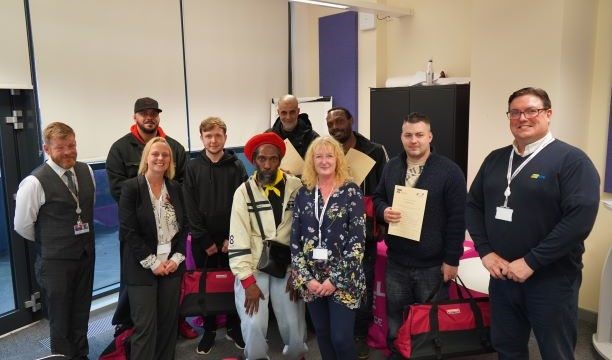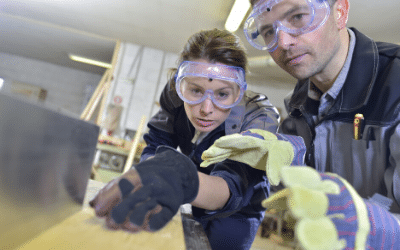
by Clair Mooney | Oct 15, 2021 | Main News Feed, Skills
Thousands of working adults will be offered free courses to rapidly upskill in STEM sectors including engineering, digital and construction.
65 short and modular courses will start to roll out from later this month at 10 Institutes of Technology (IoTs) across England in sought-after STEM subjects. This will include courses such as Digitisation of Manufacturing and Digital Construction.
The courses will be a blend of classroom and remote online study, and will vary in length from 50 to 138 hours – giving more adults greater flexibility in how and when they learn, so they can fit it around their lives.
The government’s network of Institutes of Technology – collaborations between leading employers, further education colleges and universities – specialise in delivering high-quality Higher Technical Education and training in Science, Technology, Engineering and Mathematics (STEM) subjects, such as digital, advanced manufacturing and engineering, providing employers with the skilled workforce they need.
A total of £6.4 million is being invested to support IoTs to offer the free courses, which will support up to 4,000 working adults to get on the path to a new, rewarding career and will plug local skills shortages.
Boosting the uptake and quality of Higher Technical Qualifications – that sit between A levels and degrees – and supporting adults to study more flexibly throughout their lives is a key part of the government’s landmark reforms to post-16 education and training.
A major review of higher technical education revealed these qualifications can unlock the skills employers need and lead to well paid jobs. However, it also shows that the quality of qualifications on offer at further and higher education providers can be variable and it can be hard for students and employers to find the ones that are right for them.
From September 2022, the government will start rolling out newly approved Higher Technical Qualifications, beginning with Digital, and followed by Construction and Health in 2023. A full suite of qualifications will be available by 2025.
Higher Technical Qualifications will provide a natural progression route for both young people taking T Levels or A levels, and adults looking to upskill or retrain – enabling them to take the next step up and gain higher technical skills in key subjects like STEM.

by Clair Mooney | Oct 14, 2021 | Main News Feed, Skills
Construction T-Levels are now available for the following areras of our sector:
- Design, surveying and planning
- Onsite construction with an occupational specialism in plastering which includes drylining
T-Levels are two-year courses with a 45 day industrial placement for 16 to 19 year olds. Designed with employers, each T-Level is an alternative to three A levels, and can lead to an accelerated apprenticeship. They also help young people develop the knowledge, attitude and practical skills to thrive in the workplace.
At the heart of each course, a 45-day industry placement will give you early access to the brightest talent entering your market. Employers that are interested in offering an industry placement, can get help to find a local college, school or training provider to partner with. They will support you at every stage of the industry placement so you can focus on getting the most out of your placement student.
Over the autumn, the Department for Education and SDN are hosting a series of online sessions to help employers explore, plan for, and host T-Level industry placements. They’ve started a new series to give employers a more in-depth understanding of placements for particular T-Levels. They’re also covering specific topics to support employers and their teams. Topics covered include:
- The role of the line manager and mentor in industry placements (27 October)
- Introduction to industry placements – supporting your workforce development (9 November)
- Hosting industry placements in construction roles (18 November)
- A longer two-hour industry placement workshop, to start planning for industry placements and talk with other like-minded employers (30 November)
You can find out more and register here
Candidates are available for work placement now, if you would like more information please see: https://www.tlevels.gov.uk/ If you need information, advice and/or guidance please call FIS on 0121 707 0077 or email info@thefis.org

by Clair Mooney | Oct 14, 2021 | Labour, Skills
Certificates were presented to Sandwell College adult learners to mark their successful completion of the FIS BuildBack Drylining Programme. The learners received training in drylining fixer boarder and finisher across a six week programme.
Stuart Smith Project Manager for HSS Tool Hire presented each learner with a set of tools, and in addition to the tools, each candidate is equipped for the workplace with a full set of PPE and a CSCS card. Four candidates have acquired work placements with local finishes and interiors companies and four are looking for an opportunity to demonstrate their capabilities to potential employers.
If you are interested in taking on a candidate or would like to explore how this project can help your own recruitment please contact Catherine Bullough by calling 07900 083325 or email catherinebullough@thefis.org or call Marie Flinter on 07799 903103 or email marieflinter@thefis.org
Funded through CITB, BuildBack is a collaborative recruitment and induction programme facilitated by FIS. You can find out more information at https://www.thefis.org/skills-hub/recruitment-induction/buildback/

by Clair Mooney | Oct 7, 2021 | Skills
At this week’s Conservative Party Conference there was a clear focus on skills, with the Chancellor announcing a £500 million expansion to the Plan for Jobs. This includes extending the £3,000 incentive payment for businesses hiring an apprentice until 31 January 2022, as well as extending the Kickstart Scheme to March 2022, with applications remaining open from employers and gateways until 17 December 2021.
Businesses can now also benefit from over £1 million funding that has been pledged to support apprenticeships in other businesses.
Since 13 September, levy paying employers have been able to create a pledge of up to 25% of their annual levy funds to support apprenticeships in other businesses. They can select how much funding they want to transfer and set optional criteria for the types of businesses and apprenticeships they would like to support.
Employers have already pledged over £1 million for the 2021 to 2022 financial year, with many more expected to pledge in the coming weeks. All businesses can now browse these funding opportunities and apply for funding to pay for 100% of their apprenticeship training and assessment costs (up to the funding band maximum). Levy paying employers can use their apprenticeship service accounts to review, approve or reject any pledge applications
George Swann FIS Skills and Training Lead said:
This is good news with labour for the finishes and interiors sector in short supply it will not immediately fix the problem, but if employers invest in new talent now it will reduce future impact by creating a pool of qualified individuals.

by Clair Mooney | Oct 6, 2021 | Skills
The Education and Skills Funding Agency have updated the guidance on apprenticeships initial assessment to recognise prior learning. The updated guidance supports providers to tailor apprenticeship programmes to meet apprentices’ needs by establishing the correct starting point for each apprentice. It also contains important information for employers and apprentices about the need for, and importance of, initial assessment and recognition of prior learning.
In response to industry feedback, they have included more information about how to conduct the initial assessment and assess prior learning and experience in accordance with the policy intent and the apprenticeship funding rules. The update includes:
- expanded content on why it is important to conduct initial assessment
- a new section on the benefits of recognising prior learning
- expanded content on how to conduct initial assessment and how prior learning and experience can be assessed – including a case study
- a new section on what prior learning and experience should not be included
- expanded content on who is responsible for the recognition of prior learning and experience
- a new section on how other technical education programmes that are aligned to occupational standards should be taken account of
This guidance will be kept under review as further training programmes that are aligned to employer designed occupational standards are introduced.

by Clair Mooney | Sep 25, 2021 | Labour, Skills
We need an extra 217,000 workers over the next five years to ensure construction can continue to thrive and apprenticeships will help futureproof the industry and provide an excellent route to secure a skilled, diverse future workforce.
There are a number of schemes that are supported by Levy and are free to access, and with your involvement will help bring new talent into the industry.
Here you can find out the support available from CITB and the UK Government to take on an apprentice.






